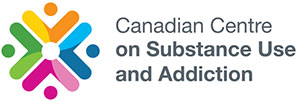The Canadian Centre on Substance Use and Addiction Welcomes Two New Board Members
Ottawa, July 10, 2018 — The Canadian Centre on Substance Use and Addiction (CCSA) is pleased to announce the appointments of Julie Menten and Daniel Hogan to its Board of Directors. Ms. Menten and Mr. Hogan will serve as members-at-large for a three-year period. The new appointees add further depth and expertise to a national board that is recognized for its diverse experience and dedication to reducing the impact of substance use harms on Canadians.
Julie Menten (British Columbia)
Ms. Menten is a senior associate at one of British Columbia’s top workplace law firms, Roper Greyell LLP. Her areas of practice include employment, labour, human rights and privacy law. She was called to the Bar of British Columbia in 2013.
Before becoming a lawyer, Ms. Menten worked as a psychotherapist and clinician working with children, youth and families. She served as a child protection social worker on an Aboriginal Family Services team for the B.C. Ministry of Children and Family Development. She also spent five years as a clinician with the Centre for Children and Families in the Justice System in London, Ontario, providing intensive mental health services to young people.
“Ms. Menten’s expertise working with youth and families is a significant addition to our Board,” said CCSA Board Chair Vaughan Dowie. “Substance use issues involving youth and families are a key focus for CCSA.”
Having a strong desire to give back to her community, Ms. Menten has served on a variety of boards and advisory committees. She is currently chair of the advisory committee for the Bottom Line Conference on workplace mental health with the B.C. branch of the Canadian Mental Health Association.
“I am extremely pleased to welcome Ms. Menten as a member of our Board,” says Rita Notarandrea, Chief Executive Officer of CCSA. “Her insights will be a great contribution to CCSA. Having that unique background of working with youth and having a strong grasp of the law, she will serve as another great resource for CCSA.”
Daniel Hogan (Ontario)
Mr. Hogan is currently the Substance Abuse Violence Prevention Coordinator of the Safe Schools Department of Durham District School Board near Toronto, Ontario. He supports the well-being of over 70,000 students and 7,000 staff members through strategic partnerships he develops and promotes.
“Daniel is a leader and a strategic thinker,” said CCSA Board Chair, Vaughan Dowie. “He will be a real asset to the Board as we chart the way forward to reducing harms among our youth.”
Mr. Hogan has a history of helping to improve the mental health of Canadian youth. For over 10 years, he was a day treatment supervisor for Frontenac Youth Services, Oshawa. The program assists emotionally struggling adolescents and their families. His current role at the school board requires him to work in close partnership with the Durham Regional Police Services and the Health Department of the Regional Municipality of Durham, as well as with local treatment and support networks in the Durham Region.
“Mental health is a key factor in how substance use and addiction are treated,” said Rita Notarandrea, CCSA’s Chief Executive Officer. “Daniel’s first hand experience providing care — especially to youth — will have a great impact on the work we do at CCSA.”
Mr. Hogan also serves as chair of both the Durham Youth Drug Awareness Committee and Racing to a Healthy Life (former Racing against Drugs Durham). He has a Bachelor of Physical and Health Education from the University of Toronto.
About CCSA
CCSA was established in 1988 by an Act of Parliament with all-party support to provide national leadership in reducing the harms of alcohol and other drugs.
CCSA’s Board of Directors is composed of 13 members. The Chair and four members are appointed by the Governor in Council. The remaining members-at-large are recruited from a number of sectors, including the business community, labour groups, and professional and voluntary organizations. Board members serve a three-year term, which can be extended for up to two additional terms.
